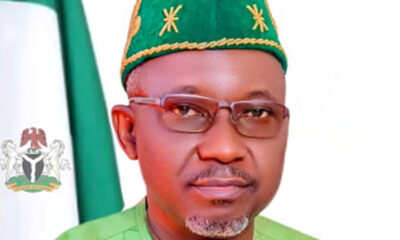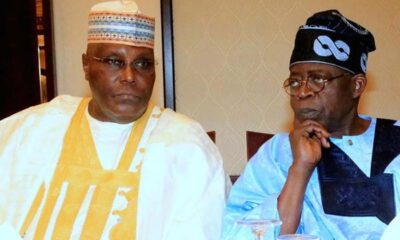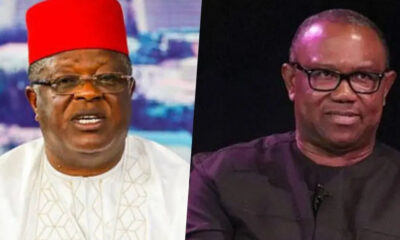Opinion
Farooq Kperogi : Neither Tinubu nor Atiku forged credentials with INEC

Farooq Kperogi : Neither Tinubu nor Atiku forged credentials with INEC
The storm over the legitimacy of the credential President Bola Tinubu submitted to INEC has managed to rope in former Vice President Atiku Abubakar who instigated it in the first place. But available facts show that neither of them presented forged documents to INEC.
I go where the facts lead me. That means I could say the opposite of what I said earlier in light of new facts, a reason I advisedly used the expression “the best obtainable version of the truth” in last week’s column. I am not invested in any perspective. Tinubu is an unrelieved catastrophe as a president, but I’ll defend the facts even if they favor him.
Here are 7 facts I’ve found so far after reading and rereading all the facts related to this issue:
1. Tinubu attended and graduated from Chicago State University in 1979, was issued a diploma (or a certificate, to use the expression that’s familiar to Nigerians), which he collected (I erred when I thought the registrar said he didn’t; See number 3). Apparently, he lost the original diploma in 1979 and was issued a “replacement diploma dated 27 June 1979,” according to the BBC.
2. In the 1990s, he applied for and got a replacement diploma from CSU. Ostensibly, because it looks different from his 1979 diploma (since diplomas bear the signatures of the current president and look like the diplomas issued that year), he got a note from the CSU registrar in 1999 affirming that he indeed graduated from the school in 1979.
3. He lost the original copy of the 1990s replacement diploma (but has a photocopy of it) and, in the 2000s, applied for yet another replacement diploma, which the university issued, but which he didn’t collect. I mistook the registrar’s reference to this bit during the deposition as him saying that Tinubu did not collecting his 1979 diploma. My apologies.
READ ALSO:
- Mohbad’s death : Coroner summons Naira Marley, Prime Boy, Sam Larry
-
Lagos govt arraigns alleged notorious land grabber for kidnapping, others
-
‘Bring killers of our members to book’ – Bolt, Uber drivers beg police
4. In 2022, Tinubu submitted a photocopy of the 1990s replacement diploma, along with the 1999 “To Whom It May Concern” note from the CSU Registrar, to INEC as the academic credential that qualifies him to run for president.
5. Opposition politicians saw it and said it wasn’t similar to diplomas CSU issued in 1979. So, they said it’s fake.
6. BBC’s Disinformation Team fact-checked the claim and found that it’s not fake. It appears fake only because it was reissued in 1998 and the university’s logo at the bottom of the diploma was chopped off during photocopying. The BBC says every other detail in the diploma is similar to the diplomas CSU issued or reissued in 1998.
7. The registrar disavowed the photocopied INEC diploma during deposition because of the absence of the logo of the university at the bottom of the diploma, but even he hinted that it “was possibly ‘cut off’ when it was photocopied.” So, it was actually a conditional disavowal.
The Foundation for Investigative Journalism (FIJ) attempted to impeach the credibility of the BBC fact check but failed.
The FIJ said, “Of particular interest was the expression, ‘with honors’, which appeared on the certificate Tinubu submitted to INEC. The presence of ‘with honours’ in Tinubu’s certificate is a tautology because the certificate goes on to read, ‘with all the rights, honours, and privileges partaining therto’.[sic]. None of the 1990s samples provided by CSU showed those words underneath the course of study, and this suggests that Tinubu’s certificate, which was supposedly obtained within the same timeframe, did not emanate from the school.”
That’s a problematic claim. “With all the rights, honors, and privileges pertaining thereto” is a fixed phrase that appears on all diplomas irrespective of their class. The addition of “with honors” isn’t a duplication because graduating with honors is an academic distinction that only a limited pool of students achieve, and some U.S. universities include it in diplomas in addition to the fixed phrase that appears on all diplomas.
In any case, Tinubu’s uncollected 2000s replacement diploma that the registrar showed during the deposition has both the fixed phrase AND “with honors.”
Similarly, the claim that the samples of replacement diplomas issued in the 1990s don’t have “with honors” is a weak argument because CSU only showed uncollected diplomas in its records, not a representative sample of every type and class of diplomas earned or re-issued that year. It could well be that the uncollected diplomas in CSU’s records didn’t achieve the distinction that entitles them to have “with honors” affixed to them.
READ ALSO:
-
Ronaldo sentenced to 99 lashes for hugging woman in Iran
-
Environmental infractions: Lagos shuts Mile 12, Owode Onirin markets
-
Internet fraud: International ‘catcher’ , accomplice jailed 16 years in Lagos
Typically, only between 20% and 30% of students graduate with honors in U.S. colleges and universities (except for Ivy League universities that have higher percentages), so it’s not a given that the uncollected diplomas in CSU’s records will be among the 20% to 30%.
FIJ also said, “Two, whoever created the controversial certificate in Tinubu’s possession copied the template of the 2000s without paying attention to timeframe variations. This is clear in one of the signatures on Tinubu’s certificate. The signature on the right is that of Zaldwaynaka “Z, the current President of CSU, who took office in 2018. A president who took office in 2018 could not have signed a certificate supposedly released in the 1990s.”
This claim seems made up because there is no “Zaldwaynaka Z” in the diploma Tinubu submitted to INEC. The photocopied CSU diploma Tinubu submitted to INEC and the samples of CSU diploma replacements from the 1990s are exactly the same except for the missing logo in Tinubu’s copy as a result of photocopying.
The registrar’s disavowal of the diploma doesn’t invalidate its authenticity because he merely said the photocopy that was shown to him didn’t look like diplomas from CSU because of the missing logo. People who have an emotional investment in the idea that Tinubu “forged” a diploma that he validly earned (which is ridiculously excessive legal literalism to begin with) leave out that context and make it seem as if the registrar’s words are an inviolable article of faith and not a conditional, context-dependent response to a specific question about a specific photocopied document that doesn’t reflect all the features of diplomas CSU issued in 1998 BECAUSE of photocopying.
This issue has demonstrated to me in starkly dramatic terms how partisan blinders can distort people’s perception of reality. When people so badly want something to be true, but it turns out to be untrue, they choose to hang on to the most absurd apophenic hallucinations (i.e., seeing predetermined patterns from a chaos of unrelated phenomena) they can invoke to validate their preconceptions. I’ve studied and taught this phenomenon for years but had never seen it manifest on a mass scale like this.
The only new thing that will change the conversation is a foolproof revelation that Tinubu didn’t meet graduation requirements and was issued a fraudulent transcript that said he did—after the fact—by dodgy university officials. That would establish the legal basis for forgery. Given what I am now reading about the school, I won’t be shocked if this happens. So, I think the answer to the puzzle isn’t on the surface; it’s beneath the surface. Only deep investigation can unearth it.
Finally, the CSU registrar never said, “forgery is a Nigerian thing.” Tinubu sent his lawyer to get copies of his academic records from CSU and requested that the school certify the documents before sending them to him.
READ ALSO:
- Breaking: FCT gets powers to use IGR for Abuja development
-
Why we’re demolishing illegal structures at Ajegunle-Araromi – Ogun govt
-
Plateau announces N4.5m as minimum hajj fare deposit for 2024 pilgrimage
Atiku’s lawyer asked if CSU had ever certified documents it sent out, and the registrar said, “No, I believe this was made because it is more of a Nigerian thing.” So, the “Nigerian thing” he referred to was certifying school records for legal purposes, not forgery.
Atiku’s School Certificate
Tinubu’s minions, in their bid to get even with Atiku, dredged up Atiku’s post-secondary school appellative change and are attempting to pass it off as evidence of school certificate forgery against him. But here are the facts.
Atiku was known as Sadiq (or Siddiq—it doesn’t matter in Muslim northern Nigeria because “Sadiq” and “Siddiq” and all other spelling variants are interchangeable) Abubakar. He was named after Abu Bakr, Islam’s first caliph whom the prophet of Islam nicknamed as “al-Siddiq,” which means “the righteous.” So, in Muslim northern Nigeria, every Abubakar (our domestication of Abu Bakr) is a Siddiq and vice versa—just like every Umar is a Farooq and vice versa.
People have asked why Atiku was tautonymous, that is, having the same first and last name— if Siddiq and Abubakar are the same. Well, in the early days of education in Northern Nigeria, people concealed their father’s names in schools to protect them from abuse from classmates. Some used toponyms (i.e., names of places) as their family names (Aminu Kano, Abubakar Tafawa Balewa, Ahmadu Rabah—before he changed to Bello—are prominent examples).
A few, however, chose the tautonymous route. Among them is former president Muhammadu Buhari. He was named after prolific ninth-century Hadith compiler Muhammad al-Bukhari who was a native of the city of Bukhara in what is now Uzbekistan. Bukhari simply means native of the city of Bukhara. But in northern Nigeria every Buhari is a Muhammad. So, Muhammadu Buhari is effectively a tautonym.
Atiku probably also initially chose the tautonymous route. I don’t know how he came about the name Atiku, but it is the Nigerian domestication of the Arabic name Atiq, which means “ancient.” Some people say it means “freed.” Bangladeshis bear it as Atiqur and Arabs bear it as Atiqullah.
More than anything, though, he swore an affidavit in real time to legalize this change of name. The same can’t be said for Bola Tinubu whom we’ve learned was initially known as Lamidi Amoda Sangodele.
Farooq Kperogi : Neither Tinubu nor Atiku forged credentials with INEC
Farooq Kperogi is a renowned Nigerian newspaper columnist and United States-based Professor of Journalism
Opinion
Who has bewitched our beloved America? – Femi Fani-Kayode

Who has bewitched our beloved America? – Femi Fani-Kayode
I really do wonder whether those great patriots that fought a long and bloody war against
British colonial rule and founded the United States of America (US) in 1776 like George Washington, Thomas Jefferson, John Adams, Benjamin Franklin and so many others envisaged what has happened to their beloved country today?
I wonder whether the Pilgrim Fathers and great and wise men of old who, by faith in the Living God, left the Old World, crossed the Atlantic ocean in hazardous conditions and went to the New to establish a new beginning and build a new nation founded on freedom, equality, the fear of God and solid good old fashioned Christian virtues and values, would believe what the beloved nation they toiled, prayed for, established and worked so hard to build has turned into today?
Would they not all be turning in their graves?
A nation that was once referred to by both friend and foe as the “land of the free and the home of the brave” is now neither free nor brave.
A mighty nation that delivered itself from its own internal prejudices, contradictions and demons by fighting a brutal civil war to free the slaves and that presented a great hope for those that dreamt of a world where all men and women could have equal opportunities, regardless of class, history, color, race or creed, has now lost its sense of decency, equity, honor and morality and turned into a corrupt, power drunk, morally bankrupt, blood-lusting, war-loving, terror-funding, egocentric and idiosyncratic collection of self-serving, self-seeking, cowardly and deluded individuals who serve the interests of not their own people but that of AIPAC, the Jewish lobby and the State of Israel.
A rich and powerful nation of over 300 million people that delivered the world from evil in both the First and Second World Wars, that defeated and dismantled the curse of Soviet Communism, that entrenched democracy throughout much of the world and that literally rules the waves today as the greatest super power in the history of humanity in a unipolar world, is now nothing but the lap dog of little Israel?
It seems so hard to believe. Yet true it is!
READ ALSO:
- Gaza: Thousands rally for hostage deal as ceasefire talks continue
- Ronaldo’s hat-trick leads Al Nassr to a 6-0 Victory over Al Wehda
- Nigeria to reduce electricity supply to Niger Republic, Benin, Togo
Like Lucifer fell from heaven, so you, O mighty America, has fallen from grace!
I weep for you.
Apart from your internal decay where the family system has been destroyed and traditional religious beliefs have been replaced by humanism and a godless philosophy in which the Lord is no longer revered, where men marry men, where abortions are encouraged, where homosexuality is adored, where Satanism is practised, where money is worshipped, where God has been banned from the schools and indeed every sphere of human endeavour and where the establishment of a New World Order is your ultimate objective, you have also, with the help of your servile and fawning vassals like the United Kingdom, France, Germany, Holland and others, debased and destroyed the fortunes and vision of many countries with your reckless and self-serving foreign policy and your insatiable thirst for power and world domination.
Opinion
Minimum wage, maximum deceit and moral cowardice – Farooq Kperogi

Minimum wage, maximum deceit and moral cowardice – Farooq Kperogi
After three months of bootless committee meetings in the comfort of air-conditioned offices at the cost of one billion naira (President Bola Tinubu approved 500 million naira to “start with… first”) and about a month after the expiration of the last minimum wage approved in 2019, the Tinubu government has not been able to approve a new minimum wage for Nigerian workers even when it wastes no time to approve policies that inflict maximum suffering on poor people.
On May 1, I woke up here in Atlanta to the news of an increase in the minimum wage of workers, which would be backdated to January 1st. Although it’s the legal thing to do, I was impressed nonetheless, not only because I’ve significantly scaled back my expectations about what the government can do but also because I know most Nigerian workers could use the relief that the increase and the arrears would bring.
So, I started looking for the exact amount of the new minimum. I scouted social media platforms and news websites. I had no luck.
It turned out that I was mistaken. The national minimum wage has not been increased even though the current one expired on April 17, which is frankly untenably criminal.
All that had happened, I later learned, was that the federal government had approved an increase of between 25 per cent and 35 per cent in the salaries of certain civil servants, according to the National Salaries, Incomes and Wages Commission (NSIWC).
“They include Consolidated Public Service Salary Structure (CONPSS), Consolidated Research and Allied Institutions Salary Structure (CONRAISS) and Consolidated Police Salary Structure (CONPOSS),” NSIWC’s spokesman by the name of Emmanuel Njoku said in a statement on April 30. “Others are: Consolidated Para-military Salary Structure (CONPASS), Consolidated Intelligence Community Salary Structure (CONICCS) and Consolidated Armed Forces Salary Structure (CONAFSS). The increases will take effect from January 1.”
READ ALSO:
- EFCC nabs 20 suspected internet fraudsters in Sapele
- Nigerian pastor under fire over porn-addiction remedy
- 40 AK-47 rifles recovered from mastermind of Kaduna-Abuja train attack
That’s some impenetrable mumbo jumbo for those of us who are not civil servants or who are not tutored in the tortured, tortuous ways of the civil service. It’s obvious, though, that this is not the new minimum wage.
A 25 percent increase on the existing minimum wage, that is, 30,000 naira, would amount to a mere additional 7,500 naira, and a 35 percent increase is a mere additional 10,500 naira. That’s lower than Edo State’s new minimum wage of 70,000 naira.
This is both exasperating and unconscionable, especially given that this government, since its inception, has understood its role as consisting of merely conceiving, initiating, and implementing policies that squeeze the hope and life out of poor and middle-class folks.
The originative signal of the intensity of the hardheartedness of this government came from the precipitate, ill-conceived, thoroughly unjustified announcement of the removal of petrol subsidies on President Tinubu’s inaugural day.
He followed this up with the disastrous “floating” of the naira, which wiped out trillions from the economy, hemorrhaged existing foreign investments, and made nonsense of the pittance workers collected as salaries.
Not done, the government chose to hike tariffs on electricity (that’s barely there to start with) to amounts that regular people can’t afford. Fairly regular electricity will now become the exclusive privilege of people and companies that can pay extortionate amounts for it. This will, of course, exacerbate the existing cost-push inflation in the economy that was ignited by the removal of petrol subsidies.
Now life has become an unwinnable daily war for most people as a result of these policies. But President Tinubu brags that these life-sucking policies represent “courage.” By that, it is obvious he meant that these policies are so soulless, so callous, so predatory that normal people would violently revolt against them but that he damned that prospect and did what he did anyway.
He should be lucky that his predecessor, Muhammadu Buhari, laid the foundation for the current mystifying docility of Nigerians, for the emergent national culture of toleration of injustice without a fight, and for the absolute death of critically collective democratic citizenship.
As I pointed out in a previous column, preying on vulnerable members of society who have lost the will to resist injustice is no courage. It’s moral cowardice. And there’s no better example of the deceit and cowardice of the government than its inability or unwillingness to implement a basic minimum wage for workers after realizing trillions of naira from the removal of petrol subsidies (which has devalued the worth of the existing minimum wage by several folds).
The government has never ever needed a committee to implement policies that hurt the poor and the middle class. All it usually needs is Tinubu’s cowardly and preposterous presidential “courage.”
READ ALSO:
- Finally, NERC unbundles TCN, creates new system operator
- I never said I’m a billionaire— Ex-Anambra CP
- Terrorists kill eight vigilantes in Kaduna community, two village heads
It only needs committees—which sit for extended periods because every sitting is a money-making venture—when any issues concern giving just a little welfare to beleaguered workers. Although the government is obligated by law to conduct nationwide public hearings as a precursor to increasing electricity tariffs, according to Femi Falana, the government chose not to be distracted by such pesky legalities in its haste to do what it seems to love to do best: make poor citizens squirm in torment and cry.
Accountable and socially responsible governments all over the world preoccupy their minds with finding ways to assuage the existential injuries that life episodically throws at citizens. But like the Buhari regime that preceded the current government, there appears to be a single-minded obsession by people in government with making life more miserable than it already is for everyday folks every day.
It seems to me that this government’s reason for being is to inflict pain and misery on Nigerians. It is what gives it its highs and delectations.
I get the sense that the strategists and tacticians of the government spend their time brainstorming on the next sadistic agony to visit on Nigerians. When they are out of ideas, they might choose to remove subsidies on the air Nigerians breathe, the land Nigerians walk on, and even the saliva Nigerians gulp.
By the end of this month, the Tinubu government will be one year old. Can it honestly point to a single thing it has done that has brought even a smidgeon of relief to our people, that has given ordinary people a reason to smile?
In less than one year, the Tinubu government has built a public image as a government that invests all its energy and resources into devising ways to hurt the people and to being a passive, unresisting servant of the IMF and the World.
We know that historically the IMF has always been opposed to increases in minimum wages. Last year, for instance, the International Monetary Fund (IMF) warned that the planned minimum wage increases in many countries in Central, Eastern, and South-Eastern Europe (CEE) should be stopped because the “increases will result in more persistent inflation or lower employment, especially given relatively weak productivity growth in the region.”
The IMF always encourages, even compels, governments in Third World countries to totally remove all subsidies that benefit the poor but warns them against increasing minimum wages.
Could the reluctance by the Tinubu government to increase the minimum wage of workers be inspired by its fear of the IMF, its lord and savior? I don’t know, but it’s worth exploring.
Well, as I pointed out in a previous column, Nigeria’s elite have a personal incentive to obey the IMF. The increased financial burden that IMF’s policies impose on poor Nigerians helps to keep them in check and renders them more docile and controllable. The poorer people are the less strength they tend to have to resist oppression and the more likely they are to be esurient for crumps from their oppressors.
So, governance by sadism is rooted in the desire to keep the vast majority of the people dirt poor, miserable, ignorant, and therefore more manipulatable.
Minimum wage, maximum deceit and moral cowardice – Farooq Kperogi
Farooq Kperogi is a renowned newspaper columnist and United States-based professor of journalism.
Opinion
Why Yahaya Bello does not represent the youth – Farooq Kperogi

Why Yahaya Bello does not represent the youth – Farooq Kperogi
A persistent but entirely illogical and factually inaccurate response to my column on former Kogi State governor Yahaya Bello revolves around the notion that his terrible record as a governor somehow delegitimizes youth participation in government and undermines the “Not Too Young to Run” bill.
First of all, Yahaya Bello became a governor at 41 in 2016. There’s no country in the world where 41 is regarded as “youth.” He is a full-grown adult.
The UN defines youth as people between the ages of 15 and 24. In the United States, it’s between 15 and 24 years. In the European Union and the United Kingdom, it encompasses individuals aged 15 to 25.
The Commonwealth limits it to the ages of 15 through 29. But the African Youth Charter, which has perhaps the most elastic definitional compass of youth in the world, defines it as “any individual between 15-35 years of age.”
The Nigerian National Youth Policy obviously derives inspirational strength for its conception of youth from the African Youth Charter because it also officially refers to people between the ages of 18 and 35 as belonging to the “youth.”
This is all a giant irony, of course. Nigeria, which has an average life expectancy of 55 years, regards 35 years as “youth” (which means, on average, Nigerians spend only 20 years as “adults”) while industrialized societies with higher average life expectancies (it’s 77 for the United States and 81 for the European Union) have a lower age threshold for youth.
It’s even worse in the general Nigerian population, which regards a 48-year-old man (who has already lived more than half of his life) as a “youth” and uses his indiscretions, ineptitude, infantilism, and larceny as justifications to shut out young people from governance.
Yahaha Bello didn’t need the “Not Too Young to Run” legislation to be a governor. The minimum age required to be a governor in the 1999 constitution—before the “Not Too Young to Run” bill was signed into law on May 31, 2018—was and still is 35. The bill did not change the age requirement for governorship positions.
READ ALSO:
- Judicial Reform: NBA seeks removal of CJN as head of NJC
- Why I’m not ashamed doing menial jobs in US — Doris Simeon
- Tinubu names Jim Ovia chairman of student loan fund
That was why we had many people who were elected governors in their 30s in 1999. For example, Ibrahim Saminu Turaki was elected governor of Jigawa State at the age of 36. Donald Duke was 38 years old when he was elected governor of Cross River State in 1999. Orji Uzor Kalu of Abia was 39. Ahmad Sani Yerima of Zamfara was 39. Enugu State’s Chimaroke Nnamani was 39.
With a few exceptions, the rest of the governors in 1999 were in their 40s (Delta State’s James Ibori was exactly 40), which is consistent with Yahaya Bello’s age. Why didn’t critics of youth participation in government invoke the failures of much younger governors than Bello at the incipience of the Fourth Republic to delegitimize “youth” participation in government?
The obsession with the youth of people in government in Nigeria is particularly strange because we have had Yakubu Gowon, a then 31-year-old unmarried man, as Head of State. Olusegun Obasanjo was 38 when he first became the head of state. Muhammadu Buhari and Thomas Aguiyi-Ironsi were 41. IBB was 44.
In fact, most of the early leaders we venerate today were elected/appointed into their positions when they were in the same age group as Yahaya Bello. For example, Sir Ahmadu Bello assumed office as the Premier of the Northern Region on October 1, 1954, at the age of 44.
Chief Obafemi Awolowo became the Premier of the Western Region in 1952 at the age of 44. Sir Abubakar Tafawa Balewa was 47/48 when he became the Prime Minister of Nigeria in 1960. Murtala Muhammed was only 36 when he became the Head of State of Nigeria on July 29, 1975.
The examples are legion, but the point is that there is nothing unusual about someone of Yahaya Bello’s age being a governor. That’s why I find the focus on his age both ignorant and ahistorical.
Of course, more than anything, all that this points to is that people who got into government in their 30s and 40s two or three decades ago are still in power or hanging around the corridors of power, which leaves only a little space for new entrants from that age bracket.
So, the few people in their 30s and 40s who make it to the circles of political power in contemporary Nigeria come across as novel, as marvels of young people in government, and as generational curiosities whose missteps are exteriorized to all people within their age range who are outside the orbit of power and who might want to get into it.
That’s unfair. Just like the incompetence, callousness, and venality of older politicians shouldn’t be used against all older people, Yahaya Bello’s villainy and corruption should not be used against people in his age bracket— or younger.
This attitude implies that had Yahaya Bello been a geriatric fuddy-duddy, and not a 48-year-old man, he would not have been the debauched, profligate thug that he is, which is absolute flapdoodle.
Age has no effect on integrity and probity. It is defeatist and evinces low self-worth for young people to beat themselves up because a 48-year-old man who became a governor at 41 turned out to be a rotten, incurable crook who pillaged his state without the slightest tinge of compunction and then installed a slavish, empty-headed puppet as his successor.
READ ALSO:
- Yahaya Bello: Court summons EFCC chair over contempt
- Nollywood veteran actor, Ogunjimi is dead
- Soldier dies while ‘rushing to rescue brother arrested by policemen’
It’s mostly young people—in the peculiar way Nigerians understand young people—who are saying Yahaya Bello’s spectacular incompetence and depravity symbolize the failure of “youth” in governance and that the older generation is justified in its reluctance to share power with young people.
In other words, if a few “youths” in government mess up, all youth should take the blame for it, accept that the failure of one of them is the failure of all of them, and then step back for the older order to continue to misrule exclusively.
Notice that no one, certainly no older person I know of, says older people shouldn’t be allowed to govern because they’ve been messing up all these years. Only the “youth” are delegitimized on account of their age when they mess up. That is reverse ageism, that is, the idea that only old age, not youth or knowledge, should confer authority or respect on people.
We are more than our ages. We embody a totality of multiple influences. The fact that Yahaya Bello was a grasping, primitive bandit in government doesn’t mean every 41-year-old who becomes a governor will be like him. That’s ridiculously reductionist.
In any case, youth or old age are not permanent states. They are in perpetual flux. It is yesterday’s youth that become today’s older people.
Nigeria is one of the world’s youngest countries with a median age of 16. Yet, when we look at the corridors of power, the vibrancy of youth is conspicuously absent. This gap between our young population and their representation in governance is not just a gap in numbers, but a gap in fresh ideas, innovation, and the spirit of our nation.
Yahaya Bello did not fail because he was young. He failed because he never prepared to succeed, and that wasn’t a function of his “youth.” Donald Duke was the second youngest governor in 1999, and he is credited with making tremendous marks in governing Cross River State.
Yes, age and experience have their place. But so does youth. An Igbo proverb, after all, says “If a child washes his hands, he could eat with Kings.”
Farooq Kperogi is a renowned Nigerian newspaper columnist and United States-based professor of journalism
-

 metro3 days ago
metro3 days agoCleric allegedly sets wife’s house ablaze following prayer disagreement in Ekiti
-

 Auto2 days ago
Auto2 days agoBKG holds all-inclusive Lagos Motor Fair, auto parts expo June 4-6
-

 Sports8 hours ago
Sports8 hours agoEPL: Man City go top after thrashing Fulham
-
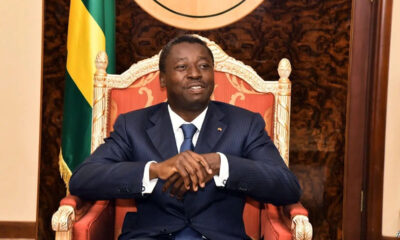
 Africa3 days ago
Africa3 days agoCivil societies, Togo president on war path over new constitution eliminating elections
-

 metro8 hours ago
metro8 hours agoWhy I claimed Ooni is my father – Man recants, apologises (+ VIDEO)
-
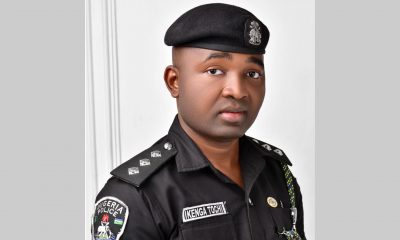
 metro3 days ago
metro3 days agoReport of killing 21 soldiers in Anambra not true – Police
-

 metro3 days ago
metro3 days agoLandlord arrested for impregnating tenant’s teenage daughter
-

 metro3 days ago
metro3 days agoYour husband is not your partner, he is the head – Daddy Freeze tells Nigerian women

